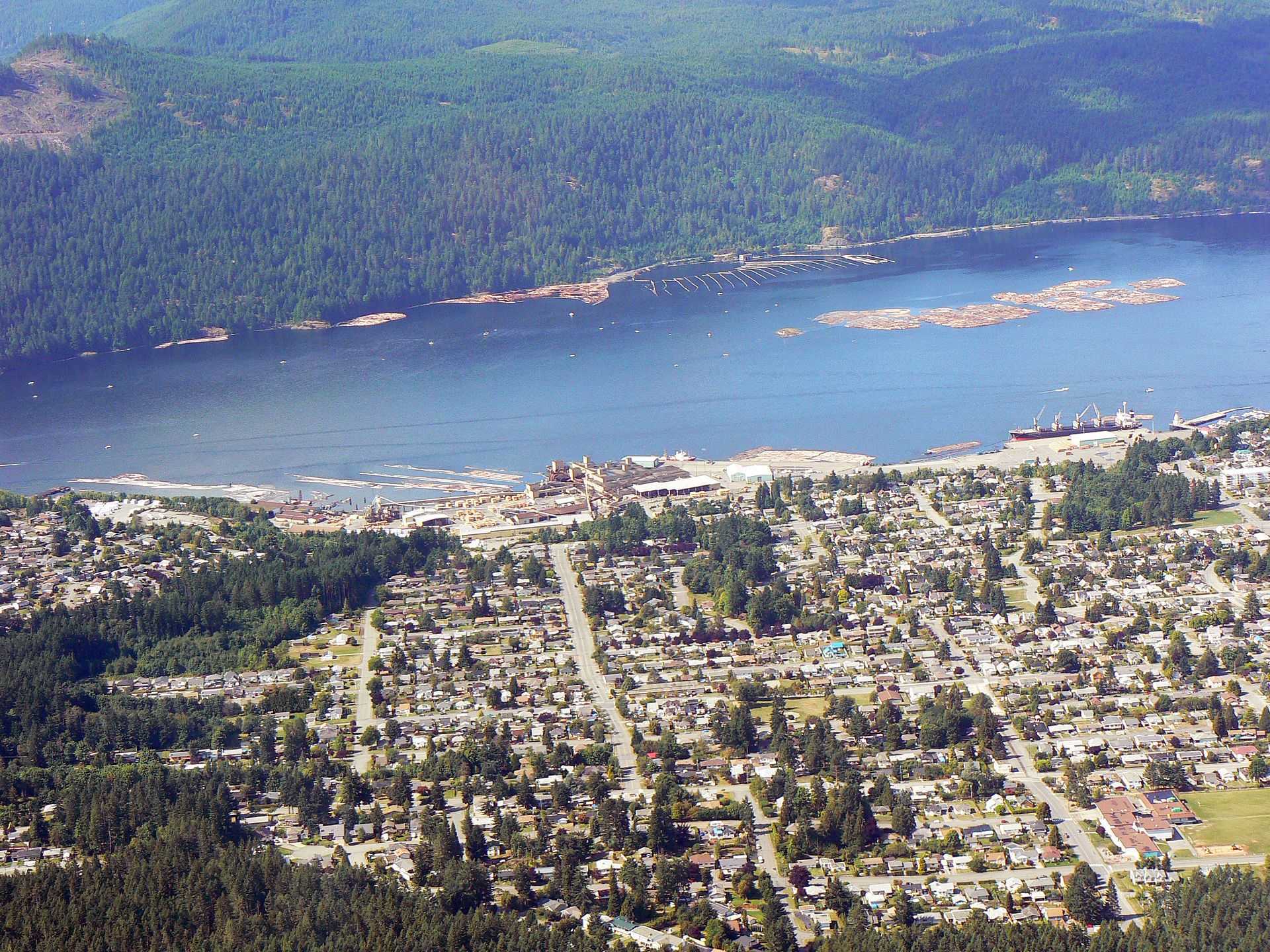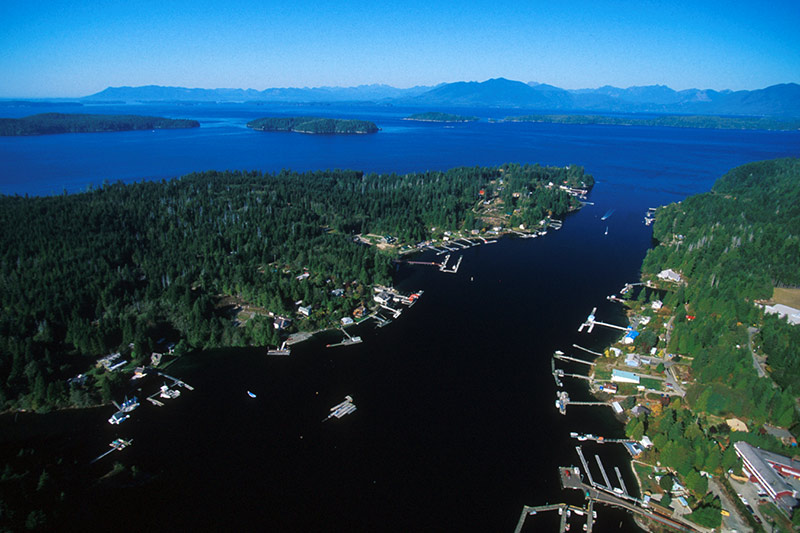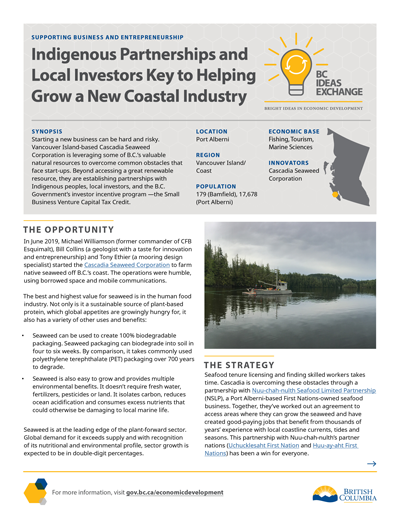Indigenous Partnerships and Local Investors Key to Helping Grow a New Coastal Industry
Port Alberni
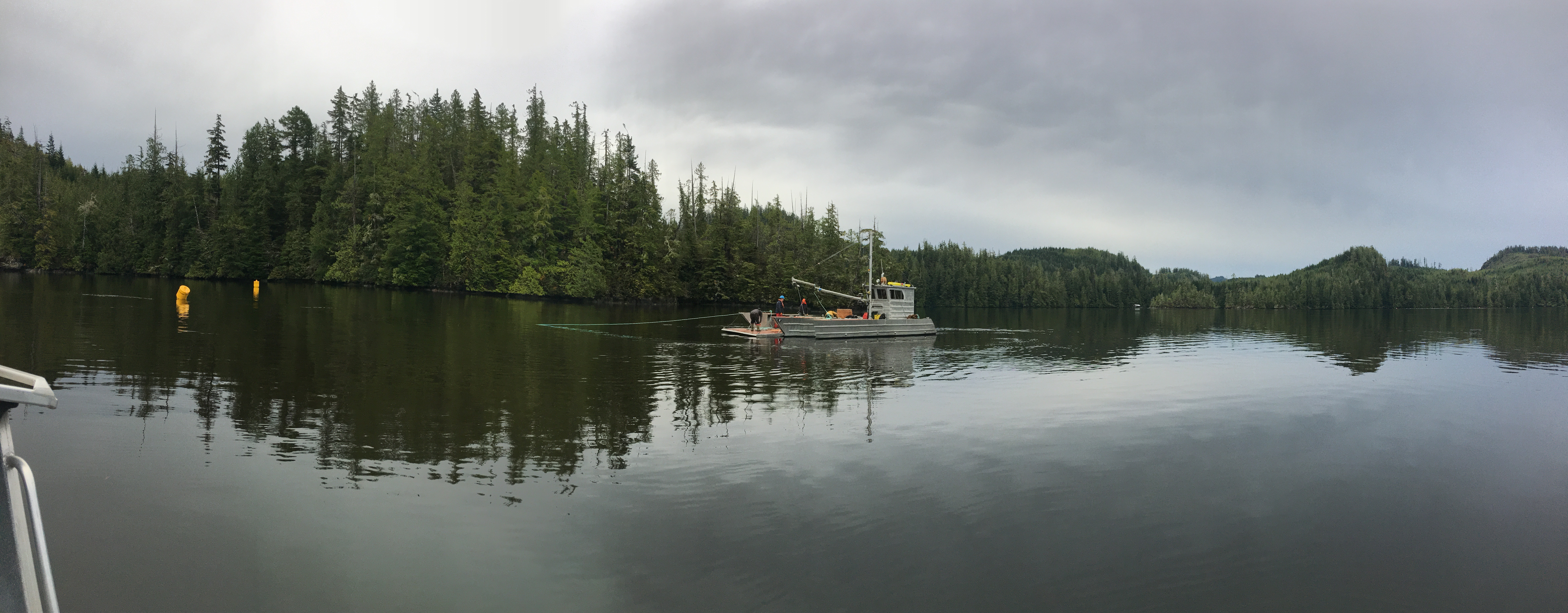
Starting a new business can be hard and risky. Vancouver Island-based Cascadia Seaweed Corporation is leveraging some of B.C.’s valuable natural resources to overcome common obstacles that face start-ups. Beyond accessing a great renewable resource, they are establishing partnerships with Indigenous peoples, local investors, and the B.C. Government’s investor incentive program - the Small Business Venture Capital Tax Credit.
The Opportunity
In June 2019, Michael Williamson (former commander of CFB Esquimalt), Bill Collins (a geologist with a taste for innovation and entrepreneurship) and Tony Ethier (a mooring design specialist) started the Cascadia Seaweed Corporation to farm native seaweed off B.C.’s coast. The operations were humble, using borrowed space and mobile communications.
The best and highest value for seaweed is in the human food industry. Not only is it a sustainable source of plant-based protein, which global appetites are growingly hungry for, it also has a variety of other uses and benefits:
- Seaweed can be used to create 100% biodegradable packaging. Seaweed packaging can biodegrade into soil in four to six weeks. By comparison, it takes commonly used polyethylene terephthalate (PET) packaging over 700 years to degrade.
- Seaweed is also easy to grow and provides multiple environmental benefits. It doesn’t require fresh water, fertilizers, pesticides or land. It isolates carbon, reduces ocean acidification and consumes excess nutrients that could otherwise be damaging to local marine life.
Seaweed is at the leading edge of the plant-forward sector. Global demand for it exceeds supply and with recognition of its nutritional and environmental profile, sector growth is expected to be in double-digit percentages.
The Strategy
Seafood tenure licensing and finding skilled workers takes time. Cascadia is overcoming these obstacles through a partnership with Nuu-chah-nulth Seafood Limited Partnership (NSLP), a Port Alberni-based First Nations-owned seafood business. Together, they’ve worked out an agreement to access areas where they can grow the seaweed and have created good-paying jobs that benefit from thousands of years’ experience with local coastline currents, tides and seasons. This partnership with Nuu-chah-nulth’s partner nations (Uchucklesaht First Nation and Huu-ay-aht First Nations) has been a win for everyone.
“It’s important to build partnerships on a common understanding and to ensure that value is provided to each party. We are providing employment and economic opportunities in an emerging climate-positive industry and we’re contributing to local food security, which aligned with Nuu-chah-nulth Seafood’s values. We could not do this without them or any of our First Nations partners,” says Cascadia Seaweed Corporation’s chief executive officer, Michael Williamson.
The next big hurdle that faces most start-up companies is raising the money to make it all happen. Friends and family are often the first people entrepreneurs go to when looking for money to start their business.
This is where the Small Business Venture Capital Tax Credit program comes in. It gives B.C.-based investors a 30% tax credit on the value of their investment into an eligible B.C.-based company. Businesses registered in the program are involved in a range of industries, including:
- Manufacturing and processing
- Research and development of proprietary technology
- Destination tourism
- Interactive digital media
- Clean technology
- Advanced commercialization
Cascadia heard about this program through its early investors and found more information on the B.C. Government Small Business Venture Capital Program website.
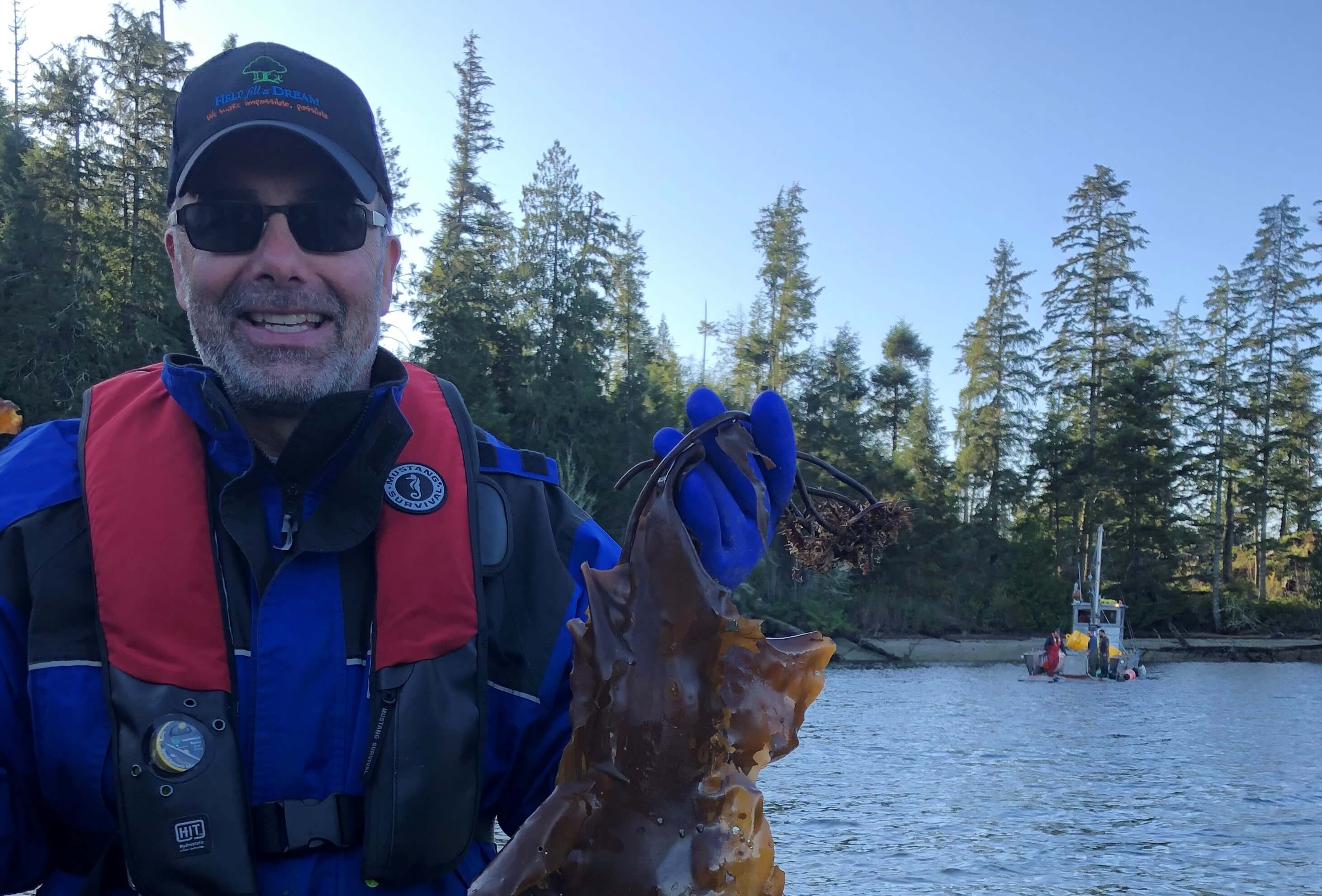
Successes
Once Cascadia was registered in the program, their friends and family had an extra incentive to invest in the company. Cascadia was able to quickly raise over $500,000 in capital. Williamson says they had so many people interested in investing that they actually “left money on the table” for the time being.
They’ve used this capital to hire two full-time and 10 part-time employees, conduct research and development and purchase supplies from local vendors to build their operations. In December 2019, Cascadia seeded its first two kelp farms off of Tzartus and Seddall Islands near Bamfield on the west coast of Vancouver Island.
Cascadia is expecting its first harvest in June 2020 and is currently in expansion mode. They’re fielding calls from big North American buyers like DuPont and Cargill and attending conferences like the BC Seafood Festival in Comox, and the Reducetarian Summit in California. They’re in discussions with at least five other First Nations and have licensing applications pending for six other places.
They’re also planning their next round of fundraising, targeting to raise $2 million to $3 million from accredited investors, with the help of the Small Business Venture Capital Tax Credit program. All this while managing operations out of the back of a furniture store and taking calls in their truck.
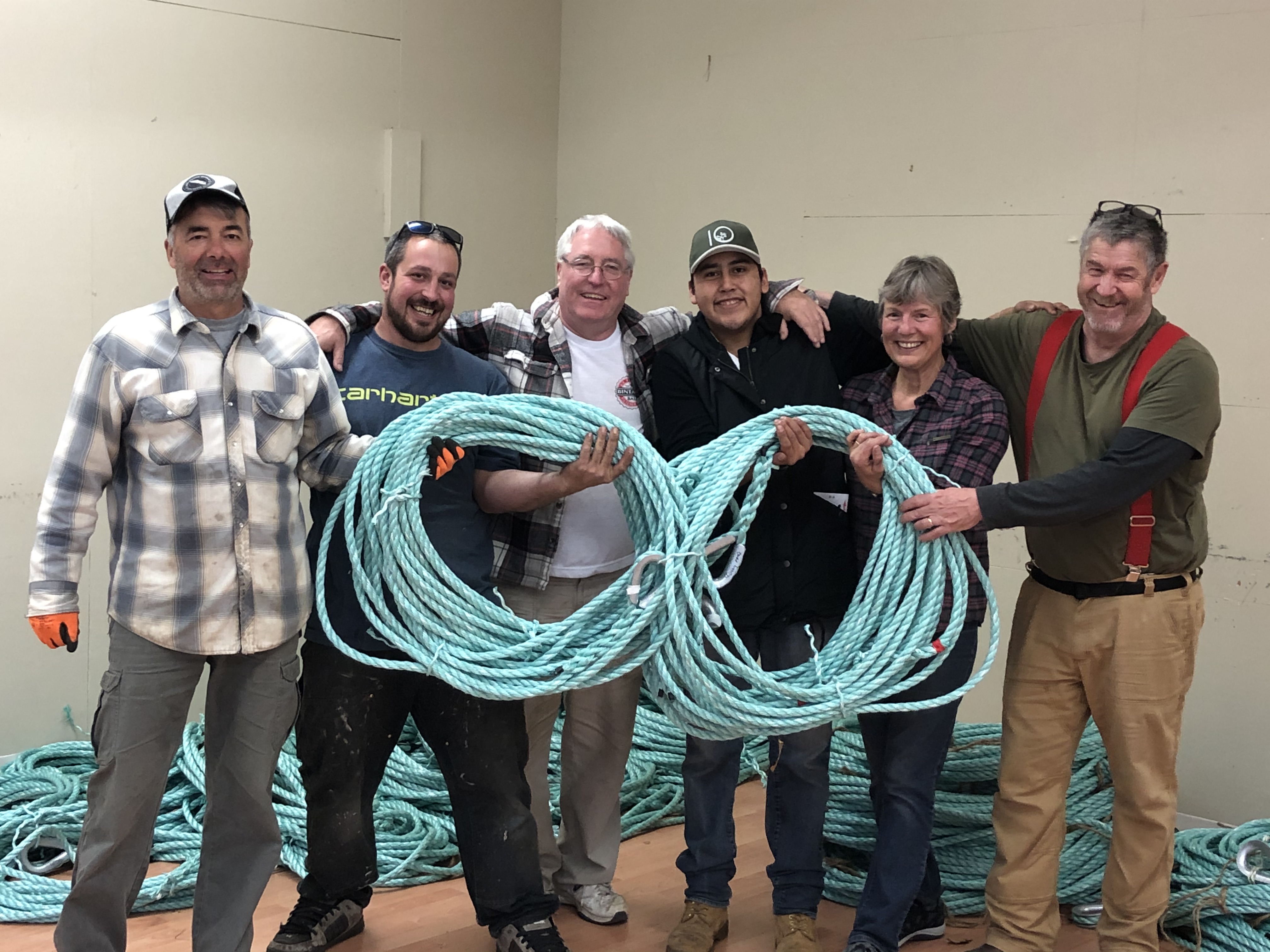
Lessons Learned
When asked about lessons learned from their start-up success, Williamson and Collins are enthusiastic to share from their experiences:
- Everyone wants straight talk - follow through and do what you say you’re going to do.
- Don’t be afraid to pick up the phone: Sometimes you can accomplish much more over the phone than through email.
- Challenge assumptions! People may say no, they may say yes, but you never know until you ask.
- Research government programs and resources. There is a lot of support out there, you just have to look for it.
Learn More
-
Watch the Venture Capital Tax Credit webinar for further program information and to hear more from Cascadia Seaweed
-
Find out more about investment capital programs helping small businesses in B.C.
-
Read the Pathways to Collaboration case studies to learn more about successful First Nations and local government economic development collaborations in B.C.
Population: 17,678
Region: Vancouver Island/Coast
Economic Base: Fishing, Tourism, Marine Sciences
Population: 179
Region: Vancouver Island/Coast
Economic Base: Fishing, Tourism, Marine Science
Contact information
Erin Bremner-Mitchell
Manager of Communications and Engagement
Cascadia Seaweed Corporation
250-818-1840

